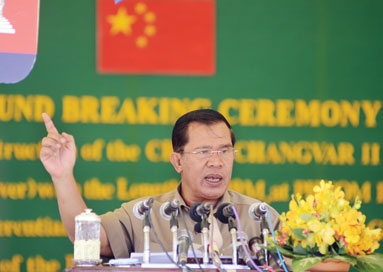 |
| I am the law: Hun Xen |
Wednesday, 28 December 2011
Sok Khemara, VOA Khmer | Washington, DC
“No one on any day is paying attention to the laws, but [they are] listening only to the prime minister.”
Prime Minister Hun Sen has called for the nullification of land certificates in protected natural areas, but opposition lawmakers and rights groups say the edict will create widespread chaos and demonstrates Cambodia’s inability to follow the rule of law.
Land issues have emerged as one of Cambodia’s biggest problems, with disputes over tracts of land across the country leading to protests, violent demonstrations and arrests.
“Leadership today has caused anarchy and turmoil in society,” said Kem Sokha, president of the minority opposition Human Rights Party. “They don’t know whether to catch the head or the tail at all, if one just follows orders, follows the word of the prime minister, who acts arbitrarily and disappears. Keeping the issues for the lower levels to pursue, they can’t pursue them.”
Cambodia’s land issues cannot be solved by local leaders, who have for a long time exchanged land certification for bribes, he said.
An unclear land law and the decentralization of power will startle people when combined with an announcement from the prime minster to nullify land certificates in protected areas, Kem Sokha said.
Speaking at a visit to a new hydroelectric dam in Pursat province on Monday, Hun Sen said he wanted to nullify land certificates in protected areas to strengthen conservation and prevent powerful officials from buying land in illegal areas. He threatened to demote officials caught buying such property.
However, Yim Sovann, a spokesman and lawmaker for the opposition Sam Rainsy Party, said local officials have given land titles to some villagers already, so Hun Sen’s edict could hurt people’s confidencein the government.
“If they have ownership certificates recognized by the government, the government cannot use a few words to say, ‘Hey, they should be nullified,’” he said. “That can create instability and cause a loss of confidence in the current administrative system today, especially with investors.”
“No one on any day is paying attention to the laws, but [they are] listening only to the prime minister,” said Ou Virak, head of the Cambodian Center for Human Rights. “In my view, that’s a country without the rule of law. And a country without the rule of law is disorderly, like today. The authorities don’t know when they need to do something, even though there are laws.”
That leads to effective mandates that only last for a short time, such as crackdowns on karaoke parlors or illegal fishing lots, he said.
“Governing a country like this is not making progress,” he said. “There’s no substantial progression because there is no structural system, no rule of law, and people aren’t equal. Those who are close to powerful people seem to have more advantages in society.”

No comments:
Post a Comment